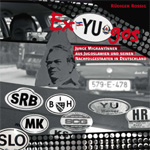Rüdiger Rossig | Journalist | Novinar
A Gypsymaniac
Rock guitarist, film composer and Balkan folk musician Goran Bregović’s new album is a big drink | By Rüdiger Rossig
Most people know his music but hardly anyone knows the name of the composer of hits like “Gas Gas Gas,” “Kalash- nikov” or “Ružica.”
Born in Sarajevo in 1955, Goran Bregović already has a more-than-remark- able career behind him. To be precise, he is right in the middle of his third one. He wasn’t even 20 when he founded Bijelo Dugme (White Button), by far the most significant Yugoslavian rock band of the 1970s and 1980s, in 1974.
Before they broke up in 1988, Bijelo Dugme had released 16 LPs and countless singles that sold millions of copies. Bregović & company are still superstars in their homeland today. More than 350,000 fans attended the three concerts of the first and – so far – only Bijelo Dugme revival tour in Sarajevo, Zagreb and Belgrade in 2005.
After the band’s breakup, Bregović primarily wrote music for films. In the 1990s, he pro- vided the soundtracks to more than 20 international produc- tions including box office hits like “Time of the Gypsies,” “Arizona Dream” and “Under- ground.”
In 1991, he changed direc- tion and produced an album for singer Alkistis Protopsalti, who was hardly known outside Greece at the time. “Paradehtika” went gold in the country where it had been produced – and was an underground hit around the world.
Productions followed for other musicians: among them the international Greek star Giorgos Dalaras; Turkish music icon Sezen Aksu; famous singers such as Kaya and pop musician Krzysztof Krawczyk from Poland; the leg- endary Iggy Pop; Beirut from the U.S.; Serbian turbo-folk star Sev- erina and the pop singer Zdravko Čolić from former Yugoslavia.
At the same time, Bregović composed operas like “Karmen with a Happy End” and works for classical orchestras, including the avant-garde string ensemble Bălănescu Quartet. And inci- dentally, his compositions and arrangements have provided the sound for various TV and radio spots over the years.
But above all, Bregović and his multitude of compositions sparked “gypsy-mania,” the international enthusiasm for the music of the southeastern European Roma that has been growing since the end of the 1980s. How did it happen that the accomplished rock musician and renowned soundtrack com- poser became interested in Gypsy music.
“Under Communism, rock music was mainly socially signifi- cant,” Bregović told The German Times. “We called a spade a spade more often than anyone else did. The music wasn’t espe- cially good – it was a provincial reflection on what was happen- ing in the world. Not much of it will stick. What will is what you have from your grandfather, your great-grandfather and your great-great-grandfather. It’s like that with Bijelo Dugme: Every- thing of value is directly influ- enced by folklore.”
In addition to turning to Balkan folk, the disintegration of his homeland Yugoslavia also played a decisive role along Bregović’s path from southern European star- dom to international fame. “When the war in Bosnia started early in the summer of 1992, we were working on ‘Arizona Dream’ in Paris,” he recalled. “That was a completely new situation for me. I mean, up to that point, I was rich, I had houses everywhere, cars – and then suddenly, nothing. Luckily, I had bought a small apartment in Paris the year before and was there when it suddenly became clear to me: ‘You’ve only been cut off from things you didn’t need anyway.’ I realized that the best thing that God can give you is the chance to start all over again.”
Unlike so many others from the former Yugoslavia active in the cultural scene, he did not despair in light of the death and misery in his homeland. Instead, Bregović wrote one soundtrack after another and started to follow a dream he had cherished for a long time.
“At the end of the 1980s, I thought I never wanted to per- form again,” he said. “But then at a Bălănescu Quartet concert in Rome, I saw how four people sitting on chairs can simply play music – without yelling, and espe- cially without the blanket ampli- fication that rock ’n’ roll needs. And I thought, I want to do it like that, too.”
Bregović put together an orchestra 10 years later – and then went on a tour that he still hasn’t returned from. After many changes, the Wedding and Funeral Orchestra finally coalesced. All the musicians in it are gypsies from the former Yugoslavia – except the bandleader.
“Now I seem to be doing things at my natural tempo,” he said. “I sit there, sip alcohol and give the orchestra and the chorus a sign here and there… that is wonder- ful. We play 100 to 150 concerts a year – I’ll be happy to keep on like that for years to come.”
Entitled “Alkohol”, Goran Bregović’s latest CD is a recent Universal release. It contains live recordings of the Wedding and Funeral Orchestra in Skopje, Belgrade and Guča, the village in western Serbia where Europe’s largest brass music festival has taken place every year since 1961.
This May, the master and his band are playing around Europe: Germany: Potsdam, Nikolaisaal, May 9, Greece: Heraklion, May 15, Poland: Bielsko Biala, May 22, Switzerland: Lucerne, May 24, France: Paris, Grand Rex, May 26, Douai, L’Hippodrôme scène nat’le, May 28, Mulhouse, La Filiature, May 29, Russia: Moscow, May 31
For more information, visit: www.goranbregovic.co.rs

 Deutsch
Deutsch  Naški
Naški  English
English 
